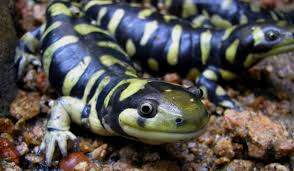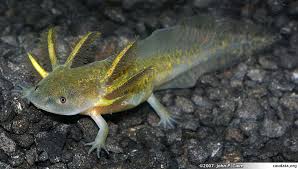Tiger Salamander Care (Ambystoma tigrinium)
Housing Adults
Adults can be maintained in a variety of enclosures depending on the keeper's wishes. The simplest enclosure is a large plastic storage box. Alternatively, the salamander can be housed in an aquarium or other enclosure that allows better viewing.
Substrates in tiger salamander enclosures should be moisture retentive to provide for adequate humidity to prevent desiccation of the salamander. There should ideally be a moisture gradient in the enclosure to allow the salamander to osmoregulate. This can be accomplished by sloping the substrate from one side of the enclosure to the other. All substrates used in terrestrial salamander enclosures should have the pH of the substrate checked prior to placing the salamander on the substrate. It has been shown that substrates with a low pH, like peat moss, may cause ion loss and eventual death of the animal. One option is moistened unbleached paper towels, with crumpled pieces of moist paper towels provide hiding areas to minimize stress. These bare enclosures are excellent for quarantine purposes and collection of fecal samples for parasite checks. To prevent accumulation of bacteria, paper toweling must be changed every few days, or when soiled. More natural substrates include moist topsoil, coconut fiber bedding, or commercially available "forest floor" soil mixes. Soil should be changed every one to two months, and feces removed daily. Warning: Do not use rocks or gravel of a size that can be swallowed; ingestion of gravel can occur during feeding, with fatal results.
Adults can be maintained in a variety of enclosures depending on the keeper's wishes. The simplest enclosure is a large plastic storage box. Alternatively, the salamander can be housed in an aquarium or other enclosure that allows better viewing.
Substrates in tiger salamander enclosures should be moisture retentive to provide for adequate humidity to prevent desiccation of the salamander. There should ideally be a moisture gradient in the enclosure to allow the salamander to osmoregulate. This can be accomplished by sloping the substrate from one side of the enclosure to the other. All substrates used in terrestrial salamander enclosures should have the pH of the substrate checked prior to placing the salamander on the substrate. It has been shown that substrates with a low pH, like peat moss, may cause ion loss and eventual death of the animal. One option is moistened unbleached paper towels, with crumpled pieces of moist paper towels provide hiding areas to minimize stress. These bare enclosures are excellent for quarantine purposes and collection of fecal samples for parasite checks. To prevent accumulation of bacteria, paper toweling must be changed every few days, or when soiled. More natural substrates include moist topsoil, coconut fiber bedding, or commercially available "forest floor" soil mixes. Soil should be changed every one to two months, and feces removed daily. Warning: Do not use rocks or gravel of a size that can be swallowed; ingestion of gravel can occur during feeding, with fatal results.

If the salamanders have a substrate that does not allow them to burrow, then alternative hideouts need to be provided to relieve stress. If the keeper desires to observe the salamander in its burrow, then pieces of PVC tubing can be cut in half and placed with the cut side against the window with an entrance above the soil level. If the side of the tank is covered with dark paper, the salamanders will adopt the burrows, and the paper can be removed when observations are desired. A water bowl may or may not be necessary depending upon the moisture gradient in the soil. However a water bowl will help prevent deaths due to accidental desiccation, as the salamander will retreat to the water bowl if the soil becomes too dry. If a water bowl is included in the enclosure, then the water should be changed either when it is soiled or every few days with dechlorinated tap water.
As with the larvae, excessive temperatures should be avoided. Temperatures over 78°F (25.6°C) for extended periods of time are potentially life threatening. The best temperature range would be the same as for the larval salamanders.
As with the larvae, excessive temperatures should be avoided. Temperatures over 78°F (25.6°C) for extended periods of time are potentially life threatening. The best temperature range would be the same as for the larval salamanders.

Feeding Adults
The temperature of the enclosure will determine the frequency of feeding the salamander. If the temperature is 65°F (18.3°C) or cooler then the salamander may be fed once a week. At temperatures over 65°F (18.3°C), the salamander will need to be fed at least twice a week. The amount of food offered will also differ depending upon the temperature, with more food items being offered at warmer temperatures. Adult tiger salamanders will readily eat crickets, freshly shed mealworms, earthworms, caterpillars (e.g., hornworms, silk moth larvae), and pinky mice. Other than pinkies or wax worms, a good rule of thumb is to offer the salamander as much as it can eat in several hours or overnight. With pinkies or caterpillars, these can be offered as an occasional treat or to fatten up a thin salamander, but because these food items contain high levels of fat, they should not be used as a steady diet. As a final caution, remove all uneaten crickets after 24 hours, as the crickets will bite and potentially harm or kill the salamander if left in the enclosure too long.
If you have any questions, please feel free to call us at 847-329-8709.
The temperature of the enclosure will determine the frequency of feeding the salamander. If the temperature is 65°F (18.3°C) or cooler then the salamander may be fed once a week. At temperatures over 65°F (18.3°C), the salamander will need to be fed at least twice a week. The amount of food offered will also differ depending upon the temperature, with more food items being offered at warmer temperatures. Adult tiger salamanders will readily eat crickets, freshly shed mealworms, earthworms, caterpillars (e.g., hornworms, silk moth larvae), and pinky mice. Other than pinkies or wax worms, a good rule of thumb is to offer the salamander as much as it can eat in several hours or overnight. With pinkies or caterpillars, these can be offered as an occasional treat or to fatten up a thin salamander, but because these food items contain high levels of fat, they should not be used as a steady diet. As a final caution, remove all uneaten crickets after 24 hours, as the crickets will bite and potentially harm or kill the salamander if left in the enclosure too long.
If you have any questions, please feel free to call us at 847-329-8709.

